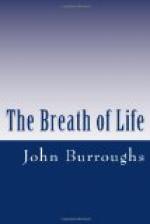V
On the threshold of the world of living organisms stands that wonderful minute body, the cell, the unit of life—a piece of self-regulating and self-renewing mechanism that holds the key to all the myriads of living forms that fill the world, from the amoeba up to man. For chemistry to produce the cell is apparently as impossible as for it to produce a bird’s egg, or a living flower, or the heart and brain of man. The body is a communal state made up of myriads of cells that all work together to build up and keep going the human personality. There is the same cooeperation and division of labor that takes place in the civic state, and in certain insect communities. As in the social and political organism, thousands of the citizen cells die every day and new cells of the same kind take their place. Or, it is like an army in battle being constantly recruited—as fast as a soldier falls another takes his place, till the whole army is changed, and yet remains the same. The waste is greatest at the surface of the body through the skin, and through the stomach and lungs. The worker cells, namely, the tissue cells, like the worker bees in the hive, pass away the most rapidly; then, according to Haeckel, there are certain constants, certain cells that remain throughout life. “There is always a solid groundwork of conservative cells, the descendants of which secure the further regeneration.” The traditions of the state are kept up by the citizen-cells that remain, so that, though all is changed in time, the genius of the state remains; the individuality of the man is not lost. “The sense of personal identity is maintained across the flight of molecules,” just as it is maintained in the state or nation, by the units that remain, and by the established order. There is an unwritten constitution, a spirit that governs, like Maeterlinck’s “spirit of the hive.” The traditions of the body are handed down from mother cell to daughter cell, though just what that means in terms of physiology or metabolism I do not know. But this we know—that you are you and I am I, and that human life and personality can never be fully explained or accounted for in terms of the material forces.
VIII
LIFE AND SCIENCE
I
The limited and peculiar activity which arises in matter and which we call vital; which comes and goes; which will not stay to be analyzed; which we in vain try to reproduce in our laboratories; which is inseparable from chemistry and physics, but which is not summed up by them; which seems to use them and direct them to new ends,—an entity which seems to have invaded the kingdom of inert matter at some definite time in the earth’s history, and to have set up an insurgent movement there; cutting across the circuits of the mechanical and chemical forces; turning




